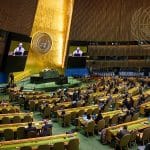As soon as the new European Commission President, Ursula von der Leyen, revealed on 10 September that Hungary’s former Minister of Justice Laszlo Trocsanyi was her proposed Commissioner for Neighbourhood and Enlargement Policy, alarm bells began sounding from EU accession aspirant countries in the Western Balkans as well as many human rights NGOs and key civil society actors in the region.
Trocsanyi is seen by EU critics as one of the major actors in undermining the justice system during the rule of Hungarian Premier Viktor Orbán, under whom he served as Minister of Justice and a member of the Constitutional Court. Trócsányi introduced a series of laws as Justice Minister that triggered legal conflicts with the Commission he now hopes to join. He also oversaw laws criminalising NGOs for helping refugees, as well as measures that led to the Central European University being forced to depart Budapest.
Difficult procedural hurdles await
Before the newly nominated commissioners assume office, the European Parliament will hold formal confirmation hearings. with the final decision ultimately in the hands of the MEPs, with one of the upcoming plenaries in October touted as the possible date for an approval vote.
It goes without saying that any nominee from Orbán’s Hungary would face rough sailing no matter what portfolio had been designated for the individual Orbán designated. In any event, Trocsanyi’s nomination is seen as an early test for the new Commission President. Some are already asking who the back-up candidate for Trocsanyi might be and whether anyone supported by Orbán can realistically be approved by MEPs. Other analysts wonder why von der Leyen specifically decided to hand the Enlargement portfolio, not an insignificant post, to a candidate that would be chosen by Orbán whose democratic credentials are strongly under challenge.
The new Commission headed by Von der Leyen can only assume office when all commissioners win MEPs’ approval in their individual committee hearings. In the past several nominees have been rejected by MEPs seeking to exert the European Parliament’s power, thus a few rejected nominations are to be expected.
Orbán’s previous nominee for a Commission slot, Tibor Navracsics, was assigned the low-profile portfolio of Education, Culture, Youth and Sport. Navracsics reportedly needed to manage a continual balancing act between Brussels and Budapest. Interestingly, Navracsics was also a former Justice Minister.
Skopje moves towards a crisis
Having invested almost all of his energy in furthering his recently renamed country’s NATO and EU accession prospects, North Macedonia’s Prime Minister Zoran Zaev would clearly be the least happy European leader to have learned of Trocsanyi’s nomination for the Enlargement and Neighbourhoods Policy Commissioner position.
There are several reasons for this, but first and foremost is the not-so-small matter of Hungary’s decision to grant former – and many would say fugitive – North Macedonian Prime Minister Nikola Gruevski political asylum.
Skopje has been pressing for Gruevski’s return for trial, but not too energetically lest Budapest changes its stance on another tough issue coming up in October, the question of whether formal start dates for EU accession negotiations should be issued for Albania and North Macedonia.
Up to now, Hungary has been perhaps the most energetic proponent of rapid EU enlargement into the Western Balkans within the Visegrad Four (V4) group of Eastern European nations – Poland, the Czech Republic, Hungary, and Slovakia.
While a positive outcome, at least for North Macedonia, appears somewhat more likely now than it did last summer when the decision was postponed as key member states were split on a decision, the nomination by Orbán of Trocsanyi will clearly complicate matters in ways we cannot yet fathom.
New Europe understands various rumours are circulating in Skopje that Orbán or the newly-appointed Commission including Trocsanyi could attempt to press Zaev into accepting Gruevski’s return. At this point, Zaev could refuse, rejecting the pressure as blackmail, and call early elections. This, however, also depends on how the decision regarding a date for North Macedonia’s EU accession negotiations is resolved since Zaev has already hinted several times that he would call elections if a date is not forthcoming.
Balkan rumours will be Balkan rumours.
The mother of all hearings
The outspoken Hungarian prime minister’s nominee stirs concern in the Western Balkans as the already strained Budapest-Skopje relationship may face additional pressure
- Advertisement -
- Advertisement -







